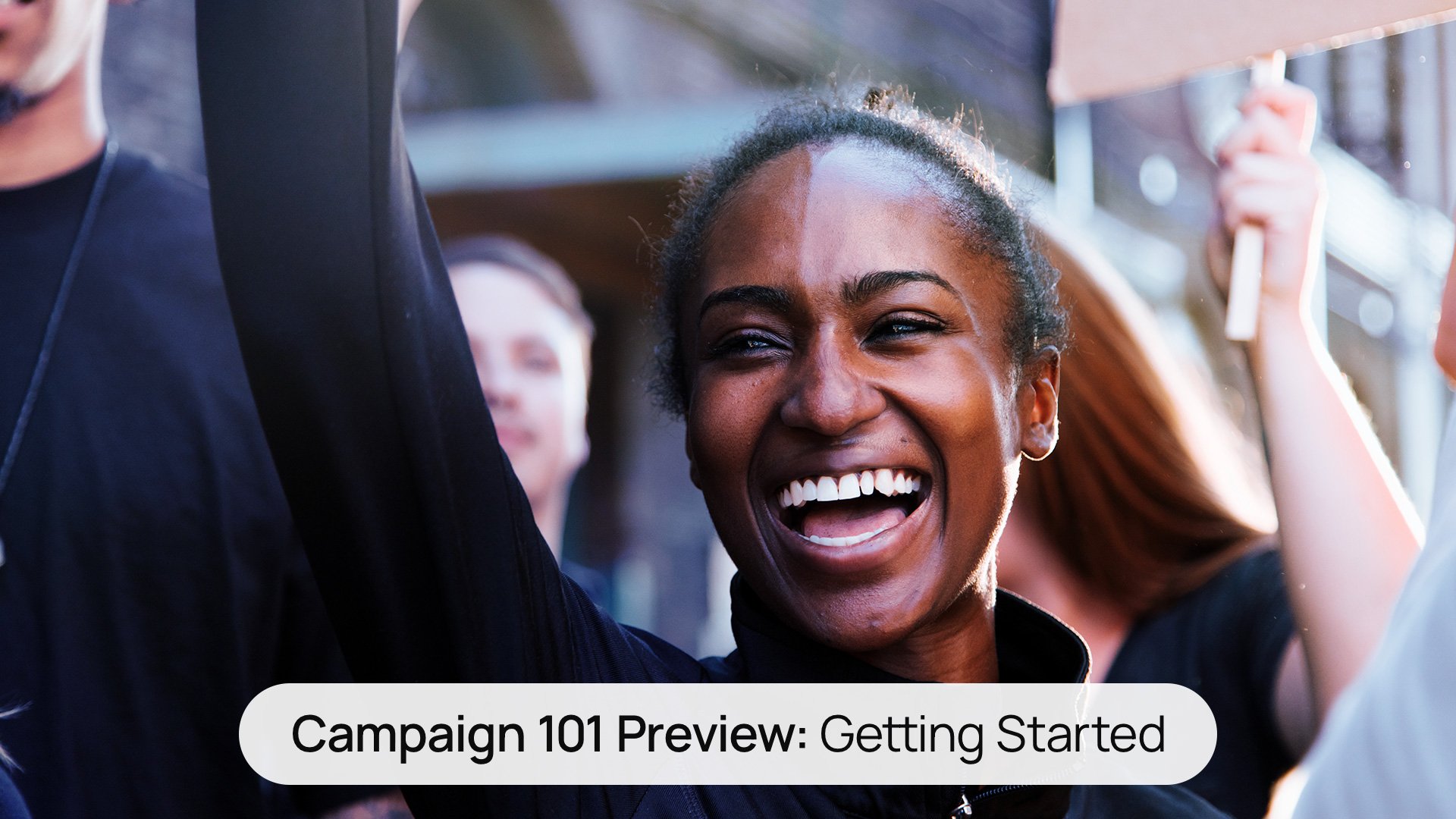Stepping Into the Spotlight: A Guide to Overcoming Imposter Syndrome
Running for office feels like stepping into a world that wasn't built for you. That nagging voice in your head whispers, "Who am I to do this?" Welcome to imposter syndrome—the feeling that you're not qualified, not ready, or somehow fooling everyone around you.
This inner critic becomes especially loud when campaigning puts you front and center. Suddenly, you're expected to give interviews, participate in debates, speak confidently in public, and ask people for money. You're claiming leadership in spaces where people who look like you, sound like you, or come from your background haven't always been welcomed.
Here's what many first-time candidates don't realize: feeling like an imposter is incredibly common, especially among people who care deeply about making a difference. The candidates who lose sleep wondering if they're good enough are often the exact ones public service needs most.
You're not alone in these feelings. And more importantly, you're not the problem.
What Imposter Syndrome Looks Like on the Campaign Trail
Imposter syndrome shows up differently for everyone, but on the campaign trail, it tends to follow predictable patterns. You might find yourself constantly second-guessing your qualifications, thinking "I don't know enough" even when you've done your homework.
The comparison game becomes brutal. You look at your opponent—maybe they're an incumbent with years of experience, or a career politician who seems to have all the right answers. Their confidence appears effortless while yours feels manufactured. You start believing you're "faking it" and that eventually, someone will expose you as unprepared.
This fear often leads to avoiding the very activities that could help your campaign succeed. You might skip debate opportunities, decline media interviews, or shy away from high-visibility events. When you do show up, you downplay your accomplishments or avoid being assertive about your positions.
Perhaps most damaging is how imposter syndrome makes you interpret feedback. A tough question from a reporter becomes evidence that you're not cut out for this. A misstep during a speech proves you don't belong. Every criticism feels like confirmation of your worst fears about yourself.
Why Imposter Syndrome Hits First-Time Candidates Hard
Politics has always felt like an exclusive club with unwritten rules that everyone else seems to know. The culture rewards confidence—even when it's performative—and punishes uncertainty, even when it's honest. For candidates from historically excluded groups, this dynamic becomes even more challenging.
If you're a woman, a person of color, LGBTQ+, working-class, or from any community that hasn't traditionally held political power, you're not just running for office—you're also breaking barriers. Every room you enter, every stage you step onto, every interview you give happens against the backdrop of knowing that people like you haven't always been welcome in these spaces.
The lack of representation compounds the problem. When you can't easily picture someone who looks like you or shares your background in the role you're seeking, it becomes harder to imagine yourself succeeding. Your brain doesn't have a clear template for what success looks like for someone like you.
Add to this the very public nature of campaigning. Most jobs allow you to learn and grow relatively privately. But running for office means your learning curve happens in front of voters, media, and opponents who are watching for any sign of weakness. It's uncomfortable because it should be—you're doing something brave and significant.
Reframing the Narrative: You Belong
The key to managing imposter syndrome isn't eliminating self-doubt—it's reframing what that doubt means. Feeling uncertain doesn't indicate you're not ready; it shows you're conscious of the stakes. You understand the weight of the responsibility you're seeking, and that awareness is actually a strength.
Think about it this way: the people who feel most confident about their readiness for office aren't necessarily the most qualified. Sometimes, they're just the most comfortable with the status quo. Your discomfort might be a sign that you're exactly the kind of fresh perspective voters need.
Authenticity is a superpower in politics, not a weakness. Voters are tired of polished politicians who seem disconnected from real struggles. Your willingness to be genuine, to admit when you don't know something, to show your learning process—these qualities make you relatable and trustworthy.
Politics desperately needs more people who reflect and question themselves, not fewer. The confidence to pause, consider different perspectives, and change course when presented with new information isn't a bug—it's a feature. These are the qualities of thoughtful leadership.
Remember that courage isn't the absence of fear. It's feeling afraid and acting anyway. Every time you step up to the microphone despite your nerves, every time you engage with a hostile audience, every time you put yourself out there knowing you might stumble—you're demonstrating the kind of bravery that real leadership requires.
Tools for Navigating Imposter Syndrome
Name It When It Shows Up
The first step in managing imposter syndrome is recognizing it in real-time. When that familiar voice starts whispering, "You don't belong here," pause and acknowledge it: "That's imposter syndrome talking." This simple recognition helps create distance between you and the negative thoughts, making them less powerful.
Keep an 'I’m Doing This' File
Create a physical or digital collection of evidence that contradicts your imposter syndrome. Save supportive messages from voters, newspaper endorsements, positive feedback from events, and notes about small wins throughout your campaign. When self-doubt creeps in, review this file to remind yourself of your impact and growth.
Rely on Your Team
Surround yourself with people who believe in you and can offer perspective when you lose sight of your own capabilities. Campaign staff, volunteers, mentors, and advisors can serve as external voices of reason when your internal voice becomes overly critical. Let them remind you of your strengths and accomplishments.
Set Micro-Goals for Visibility
Instead of avoiding uncomfortable situations, commit to doing one challenging thing each week. This might be recording a video message, attending a live event, making fundraising calls, or participating in a candidate forum. Each small step builds your confidence and proves to yourself that you can handle the spotlight.
Rewrite Your Inner Script
Pay attention to the stories you tell yourself and consciously choose more empowering narratives. Instead of "I'm not qualified for this," try "I'm new to this, but I bring something valuable." Replace "I don't know enough" with "I may not know everything, but I know enough to learn and lead effectively."
Stay Connected to Your Why
When imposter syndrome gets loud, return to your core motivation. Who are you doing this for? What problems are you trying to solve? What's at stake if you don't step up? Reconnecting with your deeper purpose helps quiet the voices that question your right to be there.
What to Remember When You're in the Spotlight
The spotlight feels unfamiliar because it is unfamiliar—but that doesn't mean you don't belong in it. Most successful politicians weren't born knowing how to handle media interviews or debate opponents. They learned these skills through practice, just like you're doing now.
Voters are looking for leaders who are real, not rehearsed. They want someone who understands their struggles and can relate to their experiences. Your authenticity and genuine concern for the community often matter more than polished talking points or decades of political experience.
You don't have to be the most polished candidate in the race. You need to be present, principled, and prepared. Show up consistently, stay true to your values, and do your homework. These fundamentals will serve you better than trying to project a confidence you don't feel.
Remember that you earned your place in this race by stepping forward when others didn't. That decision to run, to put yourself out there, to accept the responsibility of seeking public trust—that's leadership. You didn't stumble into this position; you chose it, and that choice matters.
Nobody starts out knowing everything about campaigning or governing. Growth is part of the journey, and voters understand that. They're more likely to support someone who's honest about their learning process than someone who pretends to have all the answers.
You're Not an Imposter. You're a Trailblazer.
The feelings you're experiencing don't disqualify you from leadership—they're often signs that you're taking the role seriously. The weight you feel isn't evidence that you're not ready; it's proof that you understand the responsibility you're seeking.
Self-doubt and self-trust can coexist. You can feel uncertain about your abilities while still believing in your capacity to learn and grow. You can acknowledge your inexperience while recognizing the value of your perspective and life experience.
Your lived experience, your voice, and your values are exactly what public leadership needs. Communities benefit when their representatives reflect their diversity and understand their challenges firsthand. Your background isn't a liability—it's an asset that brings essential perspectives to decision-making.
The discomfort you feel in the spotlight isn't a sign that you don't belong there. It's a sign that you're expanding, growing, and stepping into a bigger version of yourself. That process is supposed to feel uncomfortable. It means you're doing something significant.
Every time you show up despite your doubts, you're not just advancing your own campaign—you're making it easier for the next person who looks like you, sounds like you, or comes from your background to imagine themselves in leadership. You're not just running for office; you're expanding what leadership looks like.
The voice telling you that you're not qualified enough, not experienced enough, not polished enough is wrong. You're not an imposter trying to fool everyone into thinking you belong. You're a trailblazer, and trailblazers don't always have maps for where they're going.
Trust yourself. Trust your reasons for running. Trust that your community needs what you have to offer. The path forward isn't about eliminating imposter syndrome—it's about moving forward with it, knowing that courage isn't the absence of fear but action in spite of it.
You belong in that spotlight. Not because you're perfect, but because you're willing to serve, to learn, and to grow. That's exactly what leadership looks like.
Frequently Asked Questions
-
Absolutely. This feeling is incredibly common among first-time candidates, especially those who care deeply about making a difference. The truth is, you don't need to know everything before you start—politics is a field where continuous learning is expected and valued. What matters most is your willingness to do your homework, listen to constituents, and seek advice from knowledgeable sources.
Even experienced politicians are constantly learning about new issues and evolving their positions. Your awareness of what you don't know is actually a strength that shows you take the responsibility seriously.
-
Remember that authenticity is more powerful than perfection. Voters are tired of overly polished politicians who seem disconnected from real struggles. If you don't know something, it's better to say "I don't have that information with me, but I'll research it and get back to you" than to fumble through an answer you're unsure about.
Prepare thoroughly, but also accept that you might make mistakes—this is part of the learning process. Focus on your core message, your values, and the reasons you're running. These authentic elements of your campaign will resonate more than trying to project artificial confidence.
-
Experience in politics isn't the only qualification that matters to voters. Your fresh perspective, lived experience, and outsider status can actually be significant advantages. Many voters are looking for representatives who understand their daily struggles and haven't been shaped by years in the political system.
Instead of focusing on what your opponent has that you don't, emphasize what you bring that they don't—your unique background, your connection to the community, your innovative ideas, and your genuine motivation for running. Remember, every experienced politician was once a first-time candidate too.
-
Start small and build momentum through achievable wins. Set micro-goals like making a certain number of voter calls each week, attending one community event, or giving one short speech. Each time you complete these tasks, you're proving to yourself that you can handle the demands of campaigning.
Keep a record of positive feedback, endorsements, and moments when you connected with voters—this becomes evidence against your imposter syndrome. Surround yourself with supportive team members who can remind you of your strengths when self-doubt creeps in. Remember that feeling overwhelmed is normal when you're doing something significant and challenging.
-
This fear assumes there's a perfect set of qualifications for public office, but the reality is that effective leaders come from diverse backgrounds with varied experiences. Your qualifications aren't just about your resume—they include your life experience, your understanding of community needs, your values, and your commitment to serving others.
Rather than trying to hide your background or inexperience, own your story and explain how it prepared you for this role. Voters often prefer candidates who are honest about their journey and willing to grow in the position over those who claim to have all the answers from day one.






